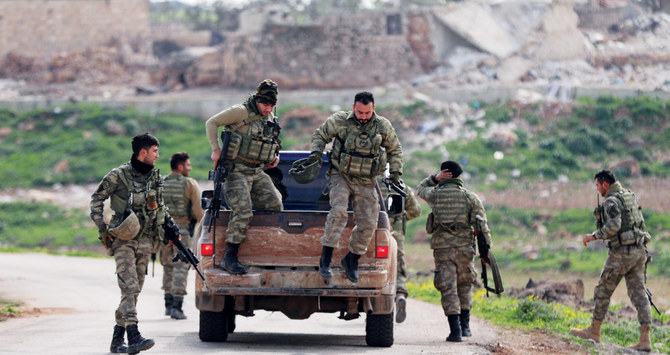ANKARA: After two Turkish police officers were killed and two others injured on Sunday in a missile attack on Azaz in northern Syria launched from the neighboring Tal Rifaat area by Syrian Kurdish People’s Protection Units, all eyes are on Ankara to see whether it will carry out a ground operation in the region.
In line with rules of engagement, Turkish security forces also retaliated after five mortar shells fired from an area controlled by the Kurdish militia landed in Turkey’s southeastern Gaziantep province on Monday.
Turkish President Recep Tayyip Erdogan vowed late on Monday that Turkey would take necessary steps in Syria as soon as possible, signaling a new operation against the Kurdish militia. “We have run out of patience. Turkey is determined to remove threats arising from northern Syria, either together with the active forces there, or by our own means,” he said during a press conference.
Ankara considers both the Syrian Kurdish People’s Protection Units and Syrian Democratic Forces as offshoots of the Kurdistan Workers’ Party, which seeks autonomy for Turkey’s Kurdish minority and has carried out attacks since 1984 against the Turkish state.
The majority part of northeastern Syria is still under the control of the Syrian Democratic Forces, whose main component is the Kurdish People’s Protection Units.
Last month, two Turkish soldiers were killed and three others injured in another attack in Syria’s Idlib de-escalation zone, the latest major opposition stronghold in Syria. Several parts of the region, home to some 4 million civilians, are patrolled by Russian and Turkish troops.
After talks between Russia and Turkey failed to produce a meaningful outcome in September, Turkey deployed more troops and tanks in Idlib to strengthen its presence against Syrian regime attacks and Russian air raids.
Following his meeting with Russian President Vladimir Putin on Sept. 29, Erdogan said that Turkey was committed to the March 2020 ceasefire with Russia and to “clearing radical elements.”
But he added that Turkey expected its partners to do the same and contribute to the de-escalation.
As part of its commitments to Russia, Turkey pledged to combat militancy in Idlib and eradicate Al-Qaeda-linked militant group Hayat Tahrir Al-Sham, while it also committed to reopen M4, a vital link between Aleppo and Latakia. Russia claims that these commitments remain unfulfilled so far.
Prof. Emre Ersen, an expert on Turkey-Russia relations from Marmara University in Istanbul, said that these attacks demonstrated the two leaders had failed to reach a conclusive agreement on Syria during their latest meeting in Sochi last week.
“However, it is unlikely that the attacks will significantly change the status quo in the region as Turkey has strengthened its military position in Idlib in the last few months and this is also why Russia will not risk a direct confrontation with the Turkish forces in order not to upset the delicate military balance in Syria,” he told Arab News.
According to Ersen, there is still no better alternative for Ankara and Moscow than trying to sustain the shaky Sochi deal they reached in March 2020 on Idlib.
“More importantly, at a time when Turkey has significant problems in its relations with the US, Russia will most probably try to take advantage of the rift between the two NATO allies and make sure that the Syrian issue does not cause a major crisis in Turkish-Russian relations for the time being,” he said.
Turkey has launched three cross-border operations in Syria since 2016 to drive the Kurdish militia and Daesh threat from its border.
Navvar Saban, a conflict analyst and expert at Omran Center for Strategic Studies, and a nonresident researcher at ORSAM in Ankara, thinks that the latest attacks against Turkish-controlled zones in Syria carry a strong message from Russia.
“These regions from where the attacks were carried out are mostly controlled by Russians and they somehow allow SDF to launch any kind of offensive. When Turkish soldiers were killed last month by the YPG (Syrian Kurdish People’s Protection Units) attack, Turkey retaliated and interestingly Russians responded to Turkey by hitting an empty area. This is a diplomatic message,” he told Arab News.
According to Saban, this latest episode underscores Russia’s willingness to push the Turkish side to communicate with Moscow instead of directly launching any kind of attack against the Kurdish militia-held areas.
“They want to show that they have the leverage in this area and although they have the ability to stop these attacks against Turkish-controlled zones, they don’t do it because they want to remind Ankara to go through its Russian counterparts before launching any operation in the area,” he said.
However, Levent Kemal, a Middle East political commentator, does not expect an imminent Turkish ground operation in the Tal Rifaat region.
“Russia accords high importance to its military depth in Syria’s Aleppo province and Tal Rifat region is considered as the forefront of such a depth. In case Turkey insists on launching an operation to Tal Rifaat, it would probably have to offer something big in return to Russia,” he told Arab News.
Tal Rifaat has been at the center of Turkish-Russian negotiations for a long time, as the region is also known as an important logistical hub for Kurdish militias while attacks against Turkish troops have been mainly carried out from this region.


























